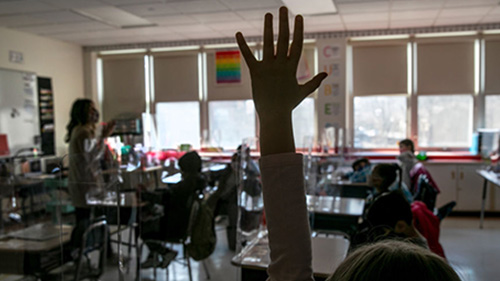Tips for Avoiding Teacher Burnout
Even if it's your life's passion, teaching can be draining.
AP & Honors Mathematics
Explore Wiley titles to support both AP and Honors mathematics instruction.
Literacy Skills & Intensive Reading
Connections: Reading – Grades 6–12
Empower student success with a proven intensive reading program that develops strong reading skills in striving readers.
Drama, Speech & Debate
Basic Drama Projects 10th Edition
Build students’ confidence and competence with comprehensive, project-based theatre instruction.
Literature
Connections: Literature
Support learners as they study dynamic, relevant texts and bring the richness of diverse voices to students through literature.
Literature & Thought
Develop critical thinking, reading, and writing across literacy themes, genres, historical eras, and current events.
Language Arts
Vocabu-Lit® – Grades 6–12
Help students build word power using high-quality contemporary and classic literature, nonfiction, essays, and more.
Connections: Writing & Language
Help students develop grammar, usage, mechanics, vocabulary, spelling, and writing and editing skills.
Reading/English Language Arts
Measuring Up to the English Language Arts Standards
Incorporate standards-driven teaching strategies to complement your ELA curriculum.
English Language Learners
Measuring Up for English Language Learners
Incorporate research-based best practices for ELLs with an approach that includes a focus on language acquisition strategies.
Mathematics
Measuring Up to the Mathematics Standards
Incorporate standards-driven teaching strategies to complement your mathematics curriculum.
Foundations
Measuring Up Foundations
Help students master foundational math skills that are critical for students to find academic success.
Science
Measuring Up to the Next Generation Science Standards
Give students comprehensive NGSS coverage while targeting instruction and providing rigorous standards practice.
Assessment
Measuring Up Live
Deliver innovative assessment and practice technology designed to offer data-driven instructional support.
For a better website experience, please confirm you are in:
3 min read
Carmel McDonald Aug 17, 2023 9:58:25 AM

You feel it, I feel it, we all feel it: group dynamics are different now. I started this article with a rather long lament about it. We don’t have as much time to teach content now that social-emotional needs prevail, the skill disparity is growing, parents aren’t as supportive, resilience has eroded…
It was a bummer. I didn’t even like reading it back. Delete.
We are where we are. We need to do what we need to do. I have no answers, but I’ll tell you about what’s going well—and what’s not—in Room 29.
Let’s start with how we’re coping with social immaturity.
Let’s talk for a minute about academic immaturity. Here’s what we are doing in my little neck of the woods, where skill disparity is on full display.
If anything, the goings-on in Room 29 have shown me that growing up ain’t easy, that I need to help that process along the best I can, and that perfection isn’t attainable, but peace is. We’ll get there. We’ll get there.


The AP® Human Geo test is fast approaching. But don't stress! Author David Palmer offers words of encouragement and advice for seeing your students...

In a 2004 Gallup survey, history and social studies ranked as the least popular subject for teenagers. Why is this? Many adults recount history class...

With 45 questions in an hour, four answer choices per question, it’s understandable why the multiple-choice section can be intimidating.

Over years of experience teaching an AP® course (in my case, AP® World History), I’ve been able to compile a list of “must do” tips and suggestions...

Many teachers consider the Document Based Question (DBQ) of the AP® European History Exam to be one of the more challenging aspects of the course....

Carmel McDonald walks you through how she walks her middle school ELA students through narrative structure with an interactive plot map. Download her...

Join Laura Kebart, CEO of Language Arts Teachers, to discuss strategies for implementing stations in your classroom! During this presentation you'll...

Teaching Advanced Placement® classes can be daunting. You’ll ask yourself questions like “what is the rigor?”; “How do I test them?”; “Should I stick...

Laura Kebart (English Language Arts Teachers) shares strategies for 6-8 ELA teachers for creating rubrics that center student improvement. {%...

It's the middle of the school year. The students you had hooked ever since your first week of activities are now starting to feel the grind of the...

September is here, which marks the start of the new school year, new routines, new classes, and new friendships!
